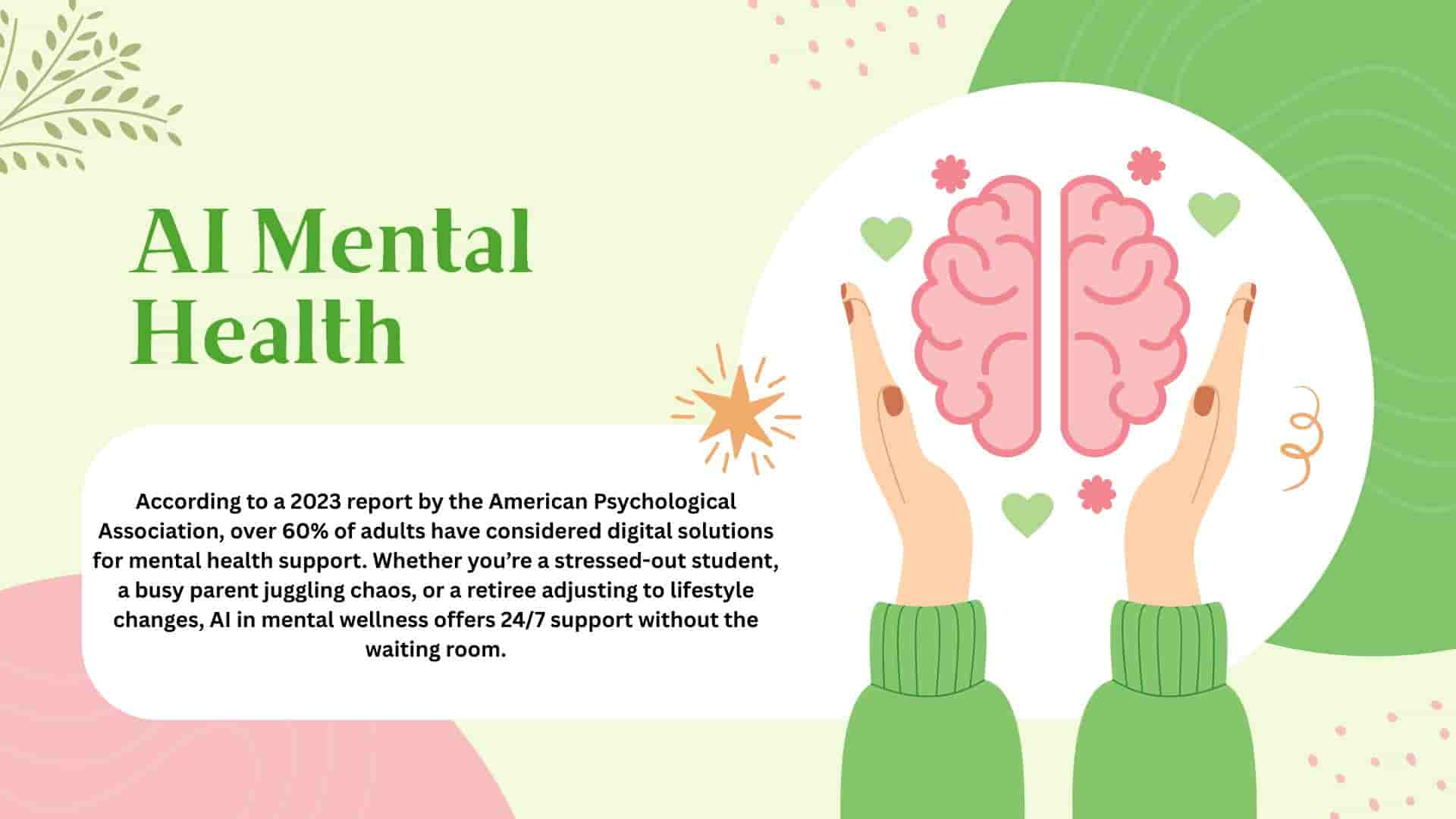Introduction
Imagine venting about a rough day to your phone and getting comfort, coping strategies, and even guided breathing exercises—no judgment, no awkward silences. Sounds futuristic? Welcome to the world of AI mental health apps, where your phone isn’t just smart—it’s emotionally intelligent.
According to a 2023 report by the American Psychological Association, over 60% of adults have considered digital solutions for mental health support. Whether you’re a stressed-out student, a busy parent juggling chaos, or a retiree adjusting to lifestyle changes, AI in mental wellness offers 24/7 support without the waiting room.
So, is your smartphone ready to be your therapist? Let’s dive into how AI is quietly revolutionizing how we cope, grow, and thrive.
What Are AI Mental Health Apps?
AI mental health apps are mobile or web-based tools designed to support emotional well-being using artificial intelligence. These apps analyze your inputs—like journal entries, voice tone, or usage patterns—to provide personalized support. Think of them as pocket-sized therapists, mood trackers, and life coaches all rolled into one.
Popular tools like Woebot, Replika, and Wysa have made waves by offering cognitive behavioral therapy (CBT), mindfulness, and emotional check-ins with a chatbot interface.
How AI Mental Health Apps Work
Natural Language Processing (NLP)
AI chatbots understand and respond to human emotions using NLP, a branch of AI that enables machines to understand, interpret, and respond to human language.
Machine Learning Algorithms
These algorithms learn from user behavior to offer increasingly personalized recommendations, making the app smarter and more empathetic over time.
Data Tracking and Insights
From sleep to mood swings, these apps track data to provide actionable insights. Want to know why you felt off every Tuesday? Your AI buddy probably has a chart for that.

Key Features of AI-Powered Mental Health Tools
- 24/7 Support: Emotional help anytime, anywhere
- Chatbot Therapy: Conversational support based on CBT
- Mood and Sleep Tracking: Graphs and insights
- Mindfulness and Meditation: Guided sessions
- Crisis Support Links: Emergency resources for critical help
-
Top AI Mental Health Apps to Explore
| App Name | Key Feature | Suitable For |
|---|---|---|
| Wysa | CBT-based chatbot | Teens to adults |
| Woebot | Humor-infused therapy | 18+ users |
| Replika | Emotional companionship | All ages |
| Youper | Emotional tracking and analysis | Adults |
| MindDoc | Mood diary with therapist insight | Young adults to seniors |
Read more: Best 5 AI Financial Advisors for 2025
Benefits of Using AI Mental Health Apps
- Accessibility: No appointments, no wait times
- Affordability: Often free or low-cost
- Anonymity: No fear of stigma or judgment
- Consistency: Daily check-ins to keep you grounded
- Educational Tools: Learn about emotional regulation
-
Read more: Read more about digital CBT by Mayo Clinic
Potential Risks and Ethical Concerns
- Privacy Issues: Data security must be prioritized
- Not a Replacement for Professionals: Apps are supportive tools, not licensed therapists
- Bias in Algorithms: AI learns from data—it can learn biases too
Read more: Ethics of AI in mental health by WHO
AI for All Ages: Tailored Mental Health Support
- Kids & Teens: Tools with gamification and parental controls
- Adults: Productivity and stress management features
- Seniors: Simple interfaces, voice-guided meditation

The Future of AI in Mental Wellness
As AI evolves, expect smarter, more empathetic tools integrated with wearable devices, voice assistants, and even virtual reality. One day, your smartwatch might sense anxiety before you do.
Final Thoughts + Call to Action
AI mental health apps are bridging the gap between emotional struggles and timely support. While they don’t replace human therapists, they offer a lifeline for those who need immediate, accessible help.
So, is it time you let your phone help manage your mood? Try one today and share your experience.
Leave your thoughts in the comments!
FAQs
1. Are AI mental health apps effective?
Yes, many users report improved mood and awareness. However, effectiveness depends on the app’s quality and user engagement.
2. Can kids use AI mental health apps?
Yes, but with supervision. Some apps are designed for teens and include safety features.
3. Is my data safe with AI mental health tools?
Reputable apps use encryption and comply with GDPR/HIPAA standards, but always review privacy policies.
4. Are these apps a substitute for therapy?
No, they complement professional therapy but don’t replace clinical intervention.
5. Which AI app is best for beginners?
Wysa and Woebot are user-friendly with simple interfaces, making them ideal starting points.


В этой статье представлен занимательный и актуальный контент, который заставит вас задуматься. Мы обсуждаем насущные вопросы и проблемы, а также освещаем истории, которые вдохновляют на действия и изменения. Узнайте, что стоит за событиями нашего времени!
Получить дополнительные сведения – https://vyvod-iz-zapoya-1.ru/